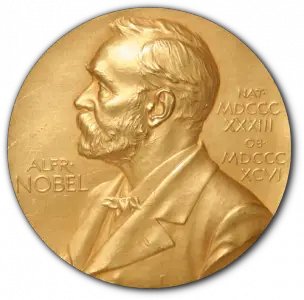Share on Social Media:
The Top 5 Winners of the Nobel Prize for Physics 2009 to 2013
| Winner | Year | Country | |
|---|---|---|---|
| 1 | François Englert Peter W. Higgs |
2013 | Belgium United Kingdom |
| 2 | Serge Haroche David J. Wineland |
2012 | Morocco United States |
| 3 | Saul Perlmutter Brian P. Schmidt Adam G. Riess |
2011 | United States United States United States |
| 4 | Andre Geimr Konstantin Novoselov |
2010 | Russia Russia |
| 5 | Charles Kuen Kao Willard S. Boyle George E. Smith |
2009 | China Canada United States |
 Special Report
Special Report
- Roy J. Glauber won for his "contribution to the quantum theory of optical coherence" and John L. Hall and Theodor W. Hänsch won for their "contributions to the development of laser-based precision spectroscopy."
- David J. Gross, H. David Politzer and Frank Wilczek won for their "discovery of asymptotic freedom in the theory of the strong interaction."
- Alexei Alexeevich Abrikosov, Vitaly Lazarevich Ginzburg and Anthony James Leggett won for their "pioneering contributions to the theory of superconductors and superfluids."
- Raymond Davis Jr. and Masatoshi Koshiba won for their "pioneering contributions to astrophysics, in particular for the detection of cosmic neutrinos" and Riccardo Giacconi won for his "pioneering contributions to astrophysics, which have led to the discovery of cosmic X-ray sources."
- Eric Allin Cornell, Wolfgang Ketterle, and Carl Edwin Wieman won for their "achievement of Bose-Einstein condensation in dilute gases of alkali atoms, and for early fundamental studies of the properties of the condensates."
Tags:
Science & Technology, Prizes & Awards, The United States
Sources: Nobelprize.org. Please visit the original source of the data here.
List Notes: In the case of more than one winner, the Nobel Prize is divided into equal amounts. Each winner receives their portion of 8,000,000 Swedish Kronor ($1.1 million U.S. dollars). "Country" is where the particular laureate was born.
Sources: Nobelprize.org. Please visit the original source of the data here.
List Notes: In the case of more than one winner, the Nobel Prize is divided into equal amounts. Each winner receives their portion of 8,000,000 Swedish Kronor ($1.1 million U.S. dollars). "Country" is where the particular laureate was born.

